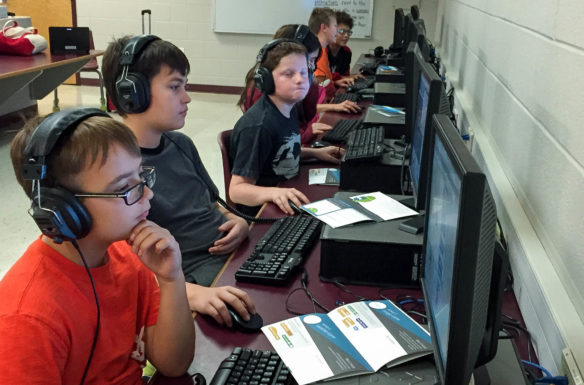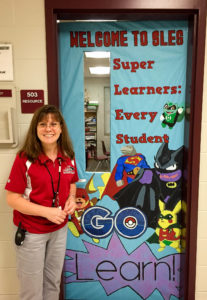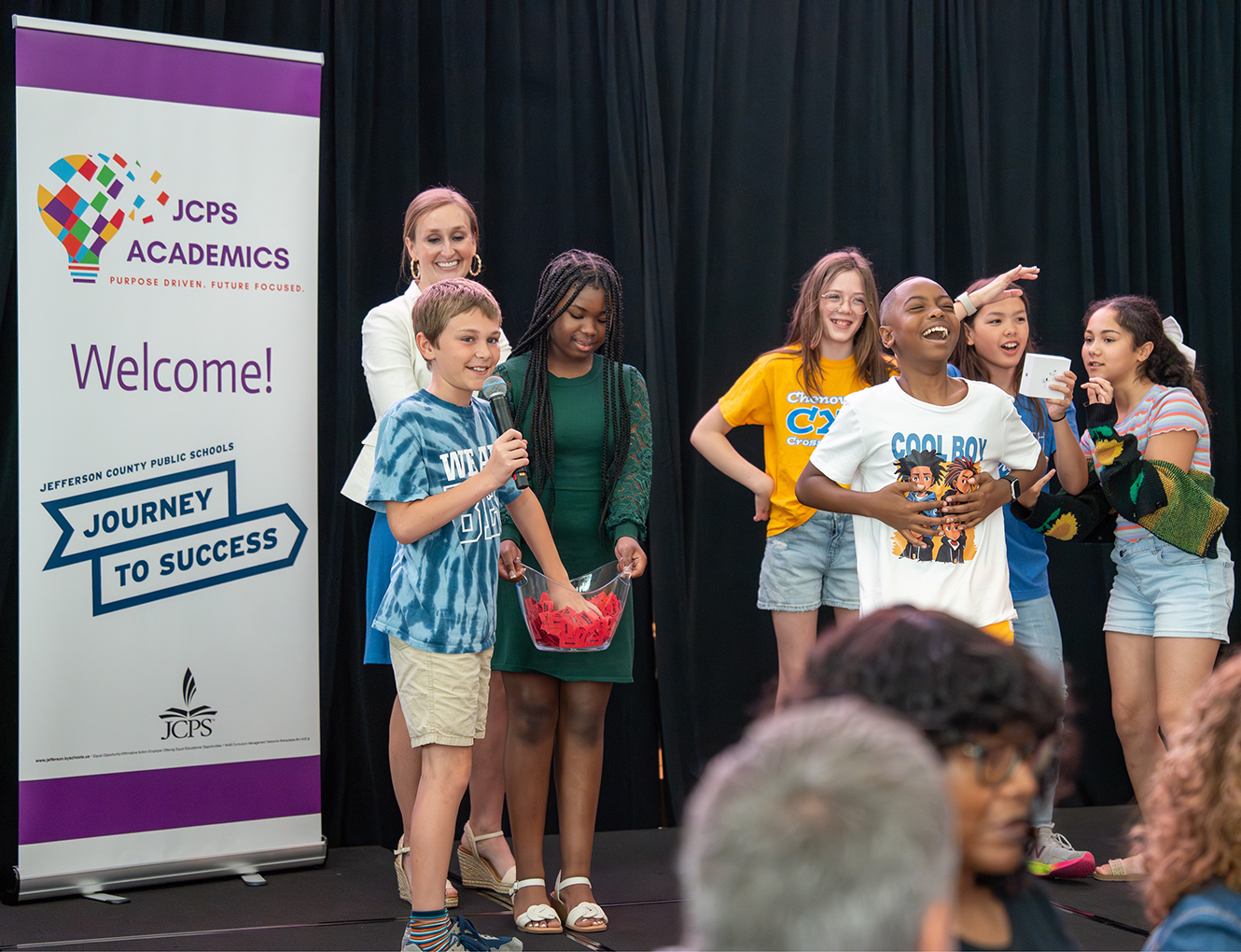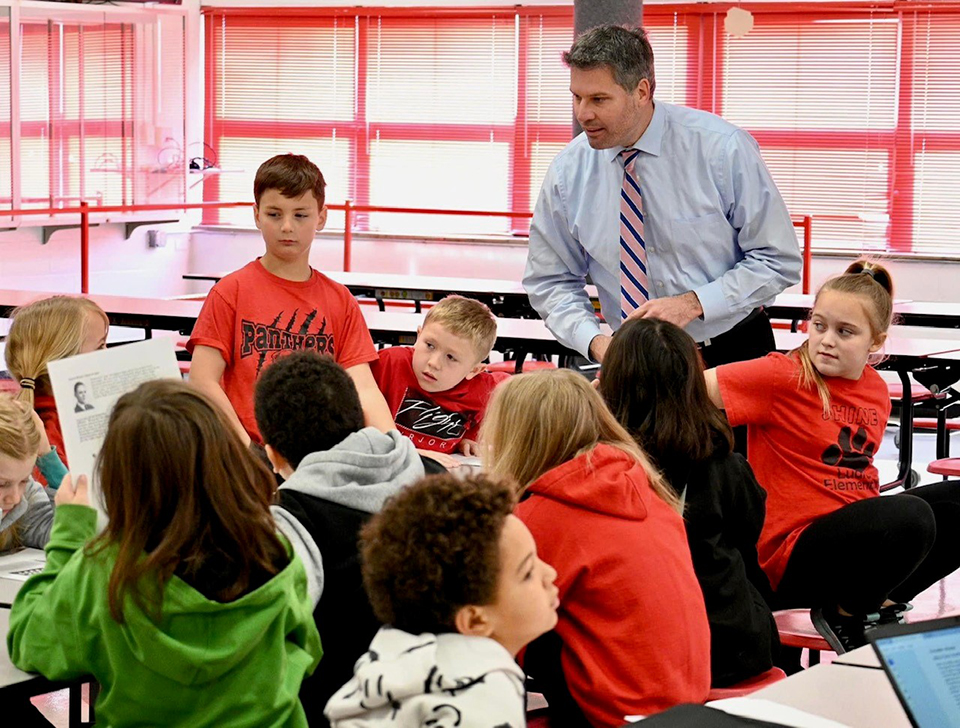
Students at South Livingston Elementary School (Livingston County) work on creating video games in the Coding Club, part of the school’s Mustang Roundup Academy 21st Century Community Learning Centers program.
Photo submitted
By Mike Marsee
michael.marsee@education.ky.gov
Cindy Kennedy has no formal training in computer programming, but she has a pretty good idea of how important it will be for her students to be comfortable around computers.
A special education teacher at South Livingston Elementary School (Livingston County), Kennedy has helped students overcome their anxieties about computers by introducing them to coding during an after-school program.
College- and career-readiness is at the heart of her endeavor, as Kennedy tries to move students toward things they didn’t think they could do.
“I’d like to maybe move at least a couple of them to realize there are jobs they’d never heard of that they can do. I also warn students there’s a high likelihood the job they eventually have may not have been invented yet,” she said. “I just feel like this is something we all need to know more about. Tools are great, but you’ve got to know how to use them.”
As many as 40 students in grades 3-6 took part in the Coding Club, which was part of the Mustang Roundup Academy, South Livingston’s 21st Century Community Learning Centers (21 CCLC) program. Kennedy helped them learn to code with the help of Google’s CS First program. Before she could do that, however, she worked to make computers a little less scary for them.
“Some of the students who came to the resource room had self-esteem issues or were just intimidated by computers,” she said. “I discovered that most of the kids played video games, and some of them were pretty good at them. I said, ‘Haven’t you beaten the computer?’ At first they thought computers were terribly smart, and I said, ‘What if I told you a computer really doesn’t know anything at all?
“I look at is as not just something to help their self-confidence, but once they figure out computers only do what we tell them to do – and telling them to do something is called coding – it makes a world of difference.”

Cindy Kennedy, a special education teacher at South Livingston Elementary School (Livingston County), created the Coding Club to help students overcome their anxieties about computers by introducing them to coding.
Photo submitted
Kennedy spoke about her work at this summer’s College and Career Readiness Summit – hosted by Murray State University’s College of Education and Human Services – in a session titled, “Teaching Kids to Code, Even If You Can’t Code.”
She told that audience how her idea started by tapping into her students’ love of video games.
“If we could attach that whole video game concept and entice them to look into things like computer programming, maybe we could open some doors to them that couldn’t be opened any other way,” she said.
Kennedy got that process started with Scratch, a program developed by Massachusetts Institute of Technology students that is available through CS First.
“Scratch is a visual program where kids don’t have to memorize words for coding so much, they recognize the blocks that go together,” she said.
Kennedy started a coding club that met once a week as part of the Mustang Roundup Academy. As many as 40 students per week started working with a CS First module on video games. There was a wide range of students from four grades, all working at different paces, but she said CS First was able to accommodate them all.
“You wouldn’t think the same program could meet all those needs, but when you use something like CS First and students are working at their own pace, it really does,” Kennedy said.
The students worked to create their own video games within the module, even helping each other along the way.
“We had one student with a mild disability who was helping more gifted students, and it did wonders for her self-esteem,” Kennedy said. “It really helps them to feel good about themselves that they can help the teacher. I think it’s really been a blessing for me, and I’ve learned quite a bit from the kids.”
When the coding club begins again next month, Kennedy plans to start with the storytelling theme, work her way into animation and then onto video games.
“Storytelling and animation would have led to better video game production,” she said.
Students who completed all of the activities last year produced eight video games, with eight stories and eight animations. They could post their work on Scratch for public viewing with usernames that didn’t reveal their identity.
“There are some people that argue it isn’t really teaching computer programming,” Kennedy said, “but I’m just trying to eliminate that fear they might have of computer programming, just give them a little access to it.”
Kennedy said the coordinator of the Mustang Roundup Academy and school administrators were on board with her idea from the beginning.
“Our coding club has opened up a world of hands-on computer programming skills that our children desperately need to learn for college- and career-readiness. Students were encouraged to work on their own, their critical thinking skills were enhanced – and in some cases developed,” said Tina Scheer, the South Livingston 21 CCLC site coordinator. “We are very grateful for the time and dedication Cindy has put into teaching our students and opening up a world of possibilities for future career opportunities.”
Kennedy said she doesn’t consider herself a tech-savvy teacher, and she knows there are many others like her.
“I would not even pretend to know how to go about writing an app,” she said. “A lot of teachers are a little more tech-phobic, but some of them don’t understand that the word coding is just referring to computer programming.”
She said she hopes to get parents more involved this year, and she would also like to see the program expand into other grade levels within the district.
“I would really like to see our program grow and maybe go into nonvisual programming at the middle school level and have high school students working on apps,” she said. “We could offer high school-level students the type of skills that they could parlay into a career, and also help the school district by providing programming that we could use.”
MORE INFO …
Cindy Kennedy cindy.kennedy@livingston.kyschools.us
Tina Scheer tina.scheer@livingston.kyschools.us



Leave A Comment